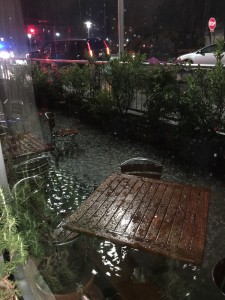When the city of Miami Beach embarked on an unprecedented $400 million project to fight back rising seas two years ago, officials boasted that raising Sunset Harbour’s perennially flooded streets would keep the tony neighborhood dry.
But while the streets rose, buildings stayed the same height. And for Sardinia Enoteca Ristorante, that difference in elevation proved to be a deal breaker when it came time to file a flood insurance claim.
Tony Gallo, who owns the restaurant at 1801 Purdy Avenue along with Pietro Vardeu, told The Real Deal that his ground-floor restaurant was swamped with several inches of water in early October after a day of heavy rainfall.
The flood racked up $15,000 in damages after his business’s furniture and floors were inundated with water. But instead of his insurer, Allstate, cutting a check, the company’s adjuster said Gallo’s policy wasn’t applicable because the neighborhood’s raised streets had effectively made Sardinia into a basement.

Sardinia’s outdoor seating area the night of the flood
“As a business, all of my investment is not protected right now,” he said. “The insurance I already had is useless because now I’m considered a basement.”
Gallo’s situation is an odd, but alarming example of how government agencies are still grappling with the nuanced problems caused by sea-level rise. Sunset Harbour’s raised streets have left a number of businesses below grade, which could put them in a similar situation when filing damage claims.
Though National Flood Insurance policies are sold by private companies like Allstate, their claims are regulated by policy language from FEMA. To be considered a basement, the agency says a structure has to be lower than the adjacent grade on all four sides.
Eric Carpenter, assistant city manager for Miami Beach, said the city has already been in contact with the head of FEMA’s insurance branch after learning of Sardinia’s situation. He said the city provided FEMA with an elevation certificate that proves Sardinia is not an actual basement, and contends that Sardinia’s separation from the street by a sidewalk means it doesn’t fit FEMA’s definition.
“The good news is that now that we’ve figured out all of these scenarios, we’re asking FEMA to get involved to educate the insurance industry,” he said.
For now, Gallo said his insurance is worthless — the basement designation means only items like an air conditioner, refrigerator or washing machine are covered. He plans to appeal Allstate’s decision.
On the night that his business flooded, two of the neighborhood’s eight pumps were out of action because of construction and a manufacturer’s defect. Though the pumps can handle rainfall when operating normally, Gallo said Sardinia may have to move from its home of 10 years if a solution isn’t found with his insurance.
“I can stay open, but I’m always at risk,” he said. “Whatever damages I’ll just have to cover myself, on top of business loss and everything.”
